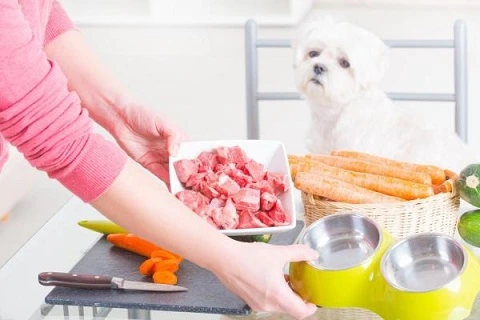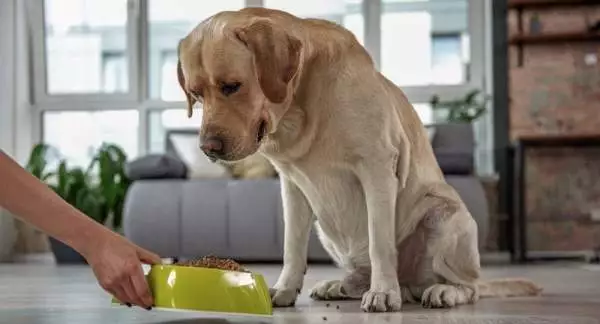Is your dog obsessed with food? Does he run to eat quickly and hardly let you fill the bowl?
Does he ask you for food every time he sees you eat? Doesn’t his weight stop increasing as your savings begin to run out?
These behaviors can be linked to various reasons that we will try to explain shortly without forgetting to provide solutions.
We will help you understand the causes and at the same time find solutions to the problem. You may also be interested in:
The origins of the dog
Understanding the dog’s origins may help you understand a little more why the dog is always hungry.
Most canids, such as wolves and dogs, live in organized societies with a well-defined hierarchy, which doesn’t necessarily have to be seen as static.
Wolves hunt in groups, and the higher-ranking individuals eat first, leaving the worst parts of the prey to lower-ranking wolves.
It is a competitive diet, that is, they eat voraciously when other animals are present. What has just been said helps to understand why our four-legged animal does not miss any opportunity to have food and how he eats quickly to prevent someone from taking away his food.

Medical causes for which a dog can become obsessed with food
But it is also true that sometimes when the dog is obsessed with food, it can be linked to certain diseases.
Some dogs tend to eat more due to inadequate production of substances necessary for the digestion of food ( digestive enzymes ) and instead, in other cases the dog’s digestive system is unable to absorb the nutrients of food (as in the case of malabsorption syndrome ) or the elements necessary to assimilate the nutrients of food are not adequately synthesized, for example in the case of diabetes.
Diabetic dogs usually eat more than those who do not suffer from this disease (and cannot gain weight but instead lose weight), and this is due to a deficiency in the hormone insulin.
This hormone has a very important function, that is, it helps to assimilate the glucose obtained from food through the cells of the dog’s body.
On the other hand, some parasites such as intestinal earthworms subtract the nutrients that the dog gets from food and will have to eat more to try to recover the number of nutrients lost.
Also, even if it’s not a disease, don’t forget that dogs that get a lot of exercises need to eat more to maintain their ideal weight.
Homemade dog food
As for us humans, palatability (ie the flavor and characteristics that make food palatable) determines whether the dog will eat more or less.
Although there are tasty treats on the market with a high percentage of approval from our pets, in most cases they prefer home food for its flavor. We must not forget that this type of diet can cause complications for our dog’s health.

How to Make Your Dog Less Food-obsessed
1. Rule out any health problems
As we have seen, there are some diseases that are the reason why dog is always hungry. For this reason, it is advisable to go to the vet to rule out any health problems.
What do I do if my dog is always hungry? Let’s move on to see some solutions that you can use and that will come in handy in your daily routine with your dog.
There are several solutions, both in the case of inadequate production of substances necessary to digest food and in cases of malabsorption of the same substances.
These solutions usually include specific diets, often commercially available but the vet will need to advise them after diagnosing the cause that triggers this reaction in the dog.
On the market, you can also find insulin for dogs, which is useful in the case of diabetes. We remind you that only the veterinarian will be able to define the recommended dosage after carrying out a check.
2. Check the amount of food and its intake
On the other hand, if our dog eats quickly, there are bowls with obstacles inserted in the bottom that can help him eat more slowly. they are called anti-voracity bowls
Furthermore, if the dog is unable to control the amount of food to be ingested, it is advisable to avoid feeding at will (refill the bowl every time he empties the bowl or always keeps it full).
On the contrary, it is advisable to measure the amount of food that you want to give to the dog.
Most kibble packs indicate the amount of food (in grams) to be provided to the dog based on the weight of the animal. This type of information is usually found on the back or side of the bag.
Care must be taken in the case of puppies because the weight indicated on the package refers to the weight of the animal when it will be an adult. Again, it is usually indicated on the label but often the masters get confused.
So, if for example in a bag of treats it is recommended to provide 200 grams to an adult dog weighing 10 and 20 kilos, it means that this amount must be given if our dog is part of a breed that reaches this weight as an adult. (for example a Beagle), even though he is now only a 4-pound puppy.
3. Beware of homemade food
In the case of homemade food, and in case the dog asks for food from the table when the owners eat, the solution is to give him nothing, ignore him and not give in to his pleas.
Remember that every time a dog asks you for food and you give it to him, you are encouraging him to follow this behavior and as a result, he will ask you for more and more food. The dog performs an action (asking for food) and gets a reward (food), surely he will do it again.
Two mistakes are usually made when trying to correct this behavior:
- In many cases, most family members will not give food to the dog but there is always a member or guest who does it out of pity (understandable on one side) or because they were unaware of the rule.
- It can also happen that, even if the dog is not normally given food when he asks for it, there are special occasions where the dog is easily allowed leftovers such as during holidays, birthdays of family members, or the dog itself, days when the food is left over. and etc.
Also, pay attention to…
It may happen that your dog’s obsession level with food has shifted to the street, starting to eat things off the ground. This behavior is reinforced and can cause the dog to start walking for treats on the road without almost lifting his head from the ground.
This is a more severe problem, as the dog may eat poorly maintained food and even leftover poisoned food. To avoid these situations, one must work on self-control through basic obedience (come, calm down, leave and etc.). For more information on this topic, we invite you to consult the specific article in which we deal with the problem.
As we have seen so far, it is not entirely uncommon for a dog to be obsessed with food but fortunately, it is a problem that can be easily solved.


